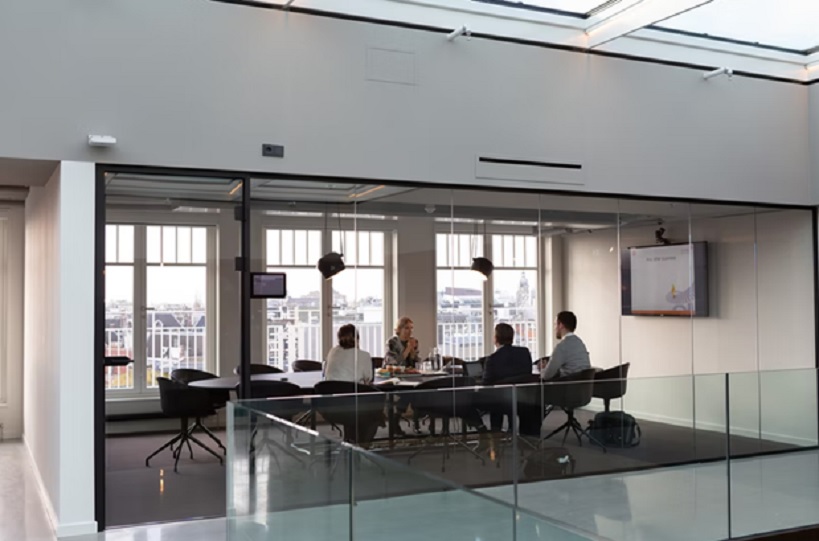Economy
6 Things You Need To Prepare Before Starting a Business in Hong Kong

Hong Kong is one of the world’s business hubs. The former British colony has a thriving tech and business sector, that attracts professionals from all over the world. In addition, due to the city’s rising population, it is a great place for business start-ups– there is a massive market there. If you want to start a business in Hong Kong, then you do need to do your research and prepare first. With so much competition, it’s fair to say that starting up there isn’t easy.
This article will tell you six things you need to know and prepare before starting a business in Hong Kong:
Registration
The first step when starting a business in Hong Kong is no different from starting a business anywhere else in the world: Registration. If you don’t register your business, then you won’t be able to pay your taxes. Tax evasion is a serious crime. In the words of the business specialists from sleek.com/hk/resources/hong-kong-business-registration-number-vs-company-registration-number/, the first thing that you need to do is to register with the Companies Registry to get limited company status. Then, you have to register with Hong Kong’s Business Registration Office. Once you have done both of these things, you are able to operate in Hong Kong. Before you register your business, you need to plan out what you are going to name it. This is because you will have to register your business in its name.
Research
The next thing that you need to do is to carefully research Hong Kong’s business scene. As already mentioned, Hong Kong has a thriving business sector, with a variety of different industries flourishing there. Researching will give you an opportunity to see which industries are doing best. You should already have an idea about what industry your business is going to operate in prior to registering it but be sure to continue researching it after registration is complete. Industries evolve and change. By constantly educating yourself, you stay ahead of any changes and know everything that there is to know about yours.
Audience
Hong Kong is one of the most densely populated places in the world. Will you be offering business services to the city’s 7.842 million residents or will you be basing yourself in Hong Kong and offering services internationally? Before you can open your business, you need to have an idea about who your audience is and how you are going to reach them. If you can’t pinpoint your audience then you need to go back to the start and redo your initial business plan. If you are going to offer Hong Kong’s residents your services, how are you going to reach them?

Mission
A mission statement is very important. If your business doesn’t have a mission statement, then you could have trouble finding investors or employees, especially in Hong Kong. Hong Kong’s business world is very formal. All businesses are expected to have a mission statement. A mission statement provides your business’s investors, customers, and employees with a vision for your company’s future. Mission statements also direct growth. They give employees the opportunity to think about how their actions will impact and shape their business. Customers and investors can also do the same. Mission statements are especially useful if you want to attract investors.
Funding
How are you going to fund your new business venture? One thing that can be confidently said about Hong Kong is that it isn’t cheap. Unless you already own property in Hong Kong, how are you going to buy or lease a base for your business? Most people rely on investors to fund their businesses. How are you going to attract investors? One very effective way of sourcing investors is to use a crowdfunding platform. Alternatively, you can use a platform where investors are able to buy shares in your business by funding your business venture.
Marketing
Finally, you need to plan out your business’s marketing. Hong Kong is not short on marketing agencies, so you can outsource this aspect of your business’s creation and management. If you want to manage it yourself then you can use influencers, social media, and content marketing. All three of these solutions are by far the marketing world’s most effective (currently). Marketing trends do change and shift rapidly, however, so it’s worth subscribing to a few business journals and magazines so that you can learn about new marketing solutions as soon as they are developed and promoted. Search engine optimization is also essential for your website.
Starting a business is an effective way of reclaiming your future and ensuring that you achieve financial independence. Hong Kong is a very competitive business environment, so it can be difficult to start a business there if you don’t properly plan and factor in all of this article’s guidance. Bear this in mind.
Economy
LIRS Urges Taxpayers to File Annual Returns Ahead of Deadline

By Modupe Gbadeyanka
All individual taxpayers in Lagos State have been advised to file their annual tax returns ahead of the March 31 deadline.
This appeal was made by the Lagos State Internal Revenue Service (LIRS) in a statement issued by its Head of Corporate Communications, Mrs Monsurat Amasa-Oyelude.
The notice quoted the chairman of LIRS, Mr Ayodele Subair, as saying that timely filing remains both a constitutional and statutory obligation as well as a civic responsibility.
The statutory filing requirement applies to all taxable persons, including self-employed individuals, business owners, professionals, persons in the informal sector, and employees under the Pay-As-You-Earn (PAYE) scheme.
In accordance with Section 24(f) of the 1999 Constitution of the Federal Republic of Nigeria, Sections 13 &14(3) of the Nigeria Tax Administration Act 2025 (NTAA), every individual with taxable income is required to submit a true and correct return of total income from all sources for the preceding year (January 1 to December 31, 2025) within 90 days of the commencement of a new assessment year.
“Filing of annual tax returns is not optional. It is a legal requirement under the Nigeria Tax Administration Act 2025. We encourage all Lagos residents earning taxable income to file early and accurately.
“Early and accurate filing not only ensures full adherence with statutory requirements, but supports effective monitoring and forecasting, which are critical to Lagos State’s fiscal planning and long-term sustainability,” Mr Subair stated.
He further noted that failure to file returns by the statutory deadline attracts administrative penalties, interest, and other enforcement measures as prescribed by law.
To enhance convenience and efficiency, all individual tax returns must be submitted electronically via the LIRS eTax portal at https://etax.lirs.net. The platform enables taxpayers to register, file returns, upload supporting documents, and manage their tax profiles securely from anywhere.
In keeping with global best practices, Mr Subair reiterated that LIRS continues to prioritise digital tax administration and taxpayer support services. He affirmed that the LIRS eTax platform is secure and accessible worldwide. Taxpayers requiring assistance may visit any of the LIRS offices or other channels.
Economy
NNPC Targets 230% LPG Supply Surge to 5MTPA Under Gas Master Plan 2026

By Adedapo Adesanya
The Nigerian National Petroleum Company (NNPC) Limited has said the Gas Master Plan 2026 targets over 230 per cent scale-up of Liquefied Petroleum Gas (LPG) supply from 1.5 million tonnes per annum (MTPA) to 5 MTPA this year.
The Executive Vice President for Gas, Power and New Energy at NNPC, Mr Olalekan Ogunleye, unveiled the strategic direction of the NNPC Gas Master Plan 2026, outlining an aggressive expansion drive to position Nigeria as a regional and global gas powerhouse.
Mr Ogunleye delivered the keynote address at the 2026 Lagos Energy Week, organised by the Society of Petroleum Engineers (SPE), where he detailed plans to accelerate gas development, deepen infrastructure and significantly scale domestic supply.
According to him, the Gas Master Plan targets a scale-up of LPG or cooking gas supply from 1.5 MTPA to 5 MTPA, alongside expanded feedstock for Mini-LNG and Compressed Natural Gas (CNG) projects.
“The NNPC Gas Master Plan 2026 is a blueprint to unlock Nigeria’s vast gas potential and translate it into tangible economic value,” Mr Ogunleye said.
He added that the strategy would also drive exponential growth in Gas-Based Industries, GBIs, strengthening local manufacturing, fertiliser production and power generation.
“Our renewed focus is on turning abundant gas resources into inclusive economic growth and improved quality of life for Nigerians,” he stated.
Mr Ogunleye said the plan aligns with the Federal Government’s Decade of Gas initiative and the presidential production targets of achieving 10 billion cubic feet per day by 2027 and 12 BCF/D by 2030.
Industry leaders at the event, including executives from Chevron Corporation, Esso Exploration and Production Nigeria Limited, Midwestern Oil and Gas Company Limited, Abuja Gas Processing Company and Shell Nigeria Gas, commended the plan and praised Ogunleye’s leadership in driving implementation excellence.
The new blueprint signals NNPC’s determination to anchor Nigeria’s energy transition on gas, leveraging infrastructure expansion and domestic utilisation to consolidate the country’s status as Africa’s largest gas reserve holder.
Economy
Shettima Blames CBN’s FX Intervention for Naira Depreciation

By Adedapo Adesanya
Vice President Kashim Shettima has attributed the Naira’s recent depreciation to the intervention of the Central Bank of Nigeria (CBN) in the foreign exchange (FX) market, stating that the currency could have strengthened to around N1,000 per Dollar within weeks if the apex bank had allowed market forces to prevail.
The local currency has dropped over N8.37 on the Dollar in the last week, as it closed at N1,355.37/$1 on Tuesday at the Nigerian Autonomous Foreign Exchange Market (NAFEM), after it went on a spree late last month and into the early weeks of February.
However, speaking on Tuesday at the Progressive Governors’ Forum (PGF), Renewed Hope Ambassadors Strategic Summit in Abuja, the Nigerian VP said the intervention was to ensure stability.
“In fact, if not for the interventions by the Central Bank of Nigeria yesterday, the 1,000 Naira to a Dollar we are going to attain in weeks, not in months. But for the purpose of market stability, the CBN generously intervened yesterday.
“So, for some of my friends, especially one of our party leaders who takes delight in stockpiling dollars, it is a wake-up call,” the vice president said.
He was alluding to CBN buying US Dollars from the market to slow down the rapid rise of the Naira.
Latest information showed that last week, the apex bank bought about $189.80 million to reduce excess Dollar supply and control how fast the Naira was gaining value.
The move was aimed at preventing foreign portfolio investors from exiting Nigeria’s fixed-income market, as large-scale sell-offs could heighten demand for US Dollars, intensify capital flight, and exert further pressure on the exchange rate.
Amid this, speaking after the 304th meeting of the monetary policy committee (MPC) of the CBN on Tuesday, Governor of the central bank, Mr Yemi Cardoso, said Nigeria’s gross external reserves have risen to $50.45 billion, the highest level in 13 years.
This strengthens the country’s foreign exchange buffers, enhances the apex bank’s capacity to defend the Naira when needed, and boosts investor confidence in the stability of the Nigerian FX market.
-

 Feature/OPED6 years ago
Feature/OPED6 years agoDavos was Different this year
-
Travel/Tourism10 years ago
Lagos Seals Western Lodge Hotel In Ikorodu
-

 Showbiz3 years ago
Showbiz3 years agoEstranged Lover Releases Videos of Empress Njamah Bathing
-

 Banking8 years ago
Banking8 years agoSort Codes of GTBank Branches in Nigeria
-

 Economy3 years ago
Economy3 years agoSubsidy Removal: CNG at N130 Per Litre Cheaper Than Petrol—IPMAN
-

 Banking3 years ago
Banking3 years agoSort Codes of UBA Branches in Nigeria
-

 Banking3 years ago
Banking3 years agoFirst Bank Announces Planned Downtime
-

 Sports3 years ago
Sports3 years agoHighest Paid Nigerian Footballer – How Much Do Nigerian Footballers Earn












